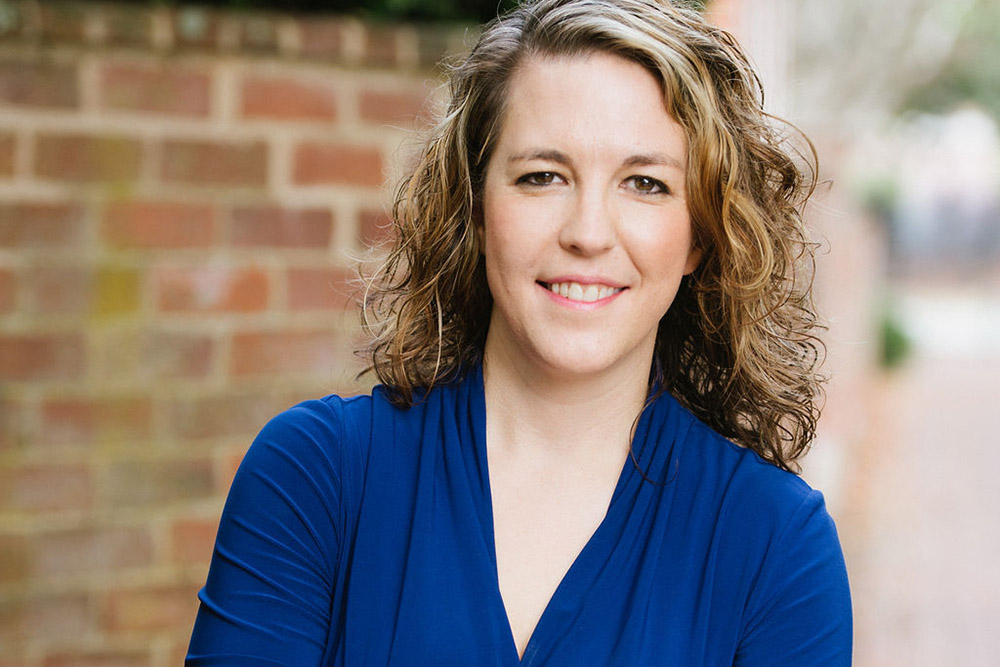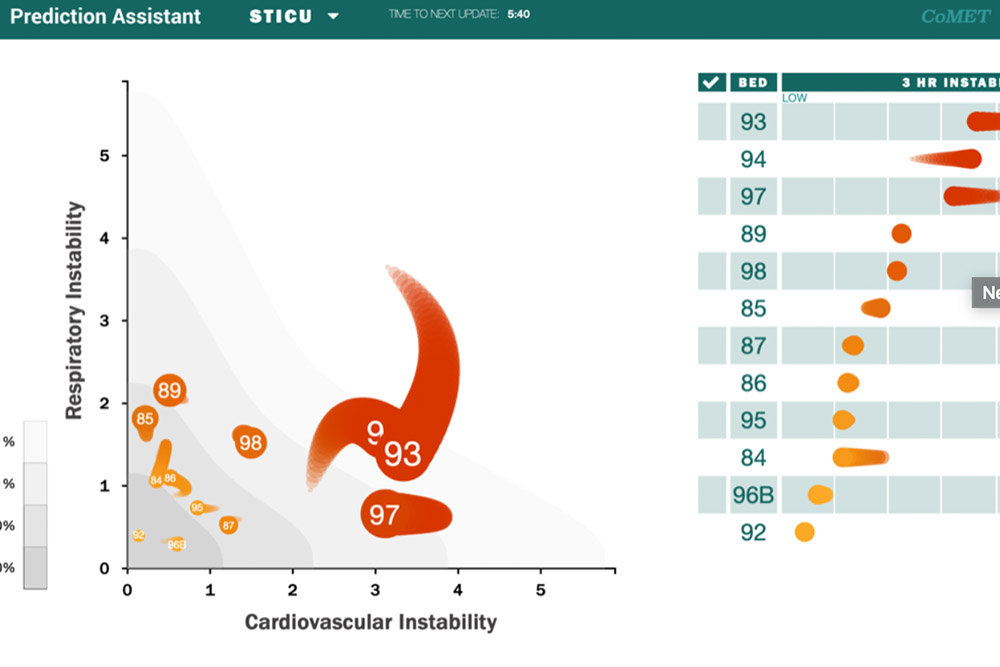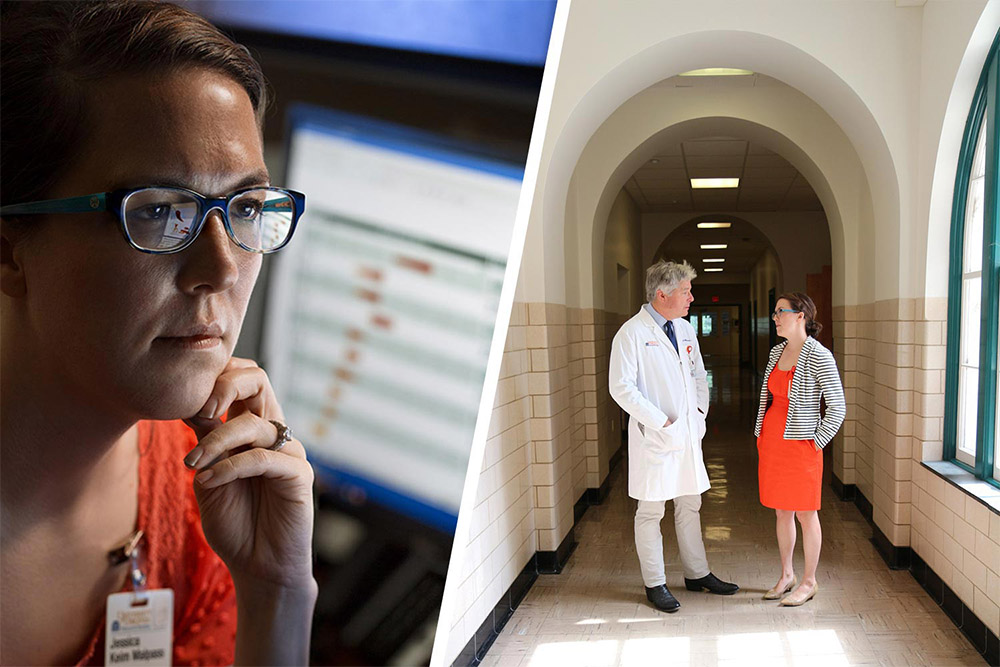Keim-Malpass named a NAM Scholar in Diagnostic Excellence

WASHINGTON — The National Academy of Medicine (NAM) has selected 10 professionals for the inaugural class of the NAM Scholars in Diagnostic Excellence program, including translational nurse scientist and associate professor Jessica Keim-Malpass.
Keim-Malpass—who, since 2018, has earned a Betty Irene Moore Fellowship, a $133,000 National Science Foundation grant, and a $454,000 National Institutes of Health grant, among others—studies the use and deployment of predictive analytics in acutely ill and vulnerable patient populations, healthcare economics, and health policy. A Costs of Care Fellow and a professor of pediatrics in UVA's School of Medicine, she is currently at work with UVA Health cardiologist Randall Moorman to study the impact of CoMET, which uses continuous monitoring to assess COVID patients' trajectories and create an image of risk and future decompensation.
For her NAM Scholars project, Keim-Malpass will focus on developing a framework for excellence in sepsis diagnosis and treatment without medical overuse and waste.


Funded by the Gordon and Betty Moore Foundation, this collaborative program with the Council of Medical Specialty Societies (CMSS) supports up to 10 scholars in a one-year, part-time experience to advance the scholars’ diagnostic skills, reduce diagnostic errors that lead to patient harm, and accelerate their career development as national leaders in this field. The scholars were chosen based on their professional qualifications and accomplishments, demonstrated leadership in the field, potential to advance diagnostic excellence, and quality, feasibility, and implementation of their project proposals.
Scholars will build upon the work of the 2015 National Academies of Sciences, Engineering, and Medicine consensus report Improving Diagnosis in Health Care, and propose the implementation of programs that will improve diagnosis and reduce diagnostic errors at the national level.
“We were delighted with the outstanding proposals submitted in the first year of this important program,” said Victor J. Dzau, president of the National Academy of Medicine. “We look forward to working with such an impressive cohort of extraordinary scholars, and my hope is that their work to improve diagnostic quality and safety will have profound effects not only on the way our health care system operates but also on the lives of patients.”
The 2021 NAM Scholars in Diagnostic Excellence and their proposal titles are:
- Jonathan Baghdadi, M.D., Ph.D., assistant professor, department of epidemiology and public health, University of Maryland School of Medicine, Baltimore
“Diagnostic Stewardship of Multiplex Molecular Panels to Reduce Diagnostic Error” - Komal Bajaj, M.D., M.S.-HPEd, chief quality officer, NYC Health + Hospitals/Jacobi, and professor of obstetrics and gynecology and women’s health, Albert Einstein College of Medicine, Bronx, New York
“Not a moment to lose! Using simulation to identify and mitigate diagnostic errors that contribute to delays during maternal hemorrhage care” - Efrén J. Flores, M.D., assistant professor of radiology, Harvard Medical School; officer, radiology community health and equity; radiologist, Thoracic and Emergency Divisions; faculty, The Mongan Institute, Massachusetts General Hospital, Boston
“A community-based participatory approach to understand current and emerging barriers and promoters to lung cancer screening (LCS) one-year post-COVID-19 pandemic start and guide culturally tailored LCS outreach among Latino communities” - Linda Geng, M.D., Ph.D., clinical assistant professor, department of medicine, Stanford University, Stanford, California
“Improving the diagnosis of underrecognized diseases in racial and ethnic minorities through patient engagement and empowerment” - Traber D. Giardina, Ph.D., M.S.W., assistant professor, department of medicine, Baylor College of Medicine; investigator, Center for Innovations in Quality, Effectiveness and Safety, Michael E DeBakey Houston Veteran Affairs Medical Center, Houston
“Overcoming Barriers to Diagnostic Safety for Underrepresented Populations: Implementing Structured Tools to Engage Patients in Diagnosis (The ISTEP Dx Project)” - Cornelius A. James, M.D., general internist and general pediatrician; medical educator, departments of internal medicine and pediatrics, University of Michigan Medical School, Ann Arbor
“Data Augmented, Technology Assisted Medical Decision Making and Diagnosis (DATA-MD): A Novel Curriculum” - Jessica Keim-Malpass, Ph.D., R.N., associate professor, department of acute and specialty care, School of Nursing; department of pediatrics, School of Medicine, University of Virginia, Charlottesville
“Developing an economic framework to achieve diagnostic excellence in sepsis: Achieving balance between early diagnostic action and medical overuse” - Mei-Sing Ong, Ph.D., assistant professor, department of population medicine, Harvard Medical School and Harvard Pilgrim Health Care Institute, Boston
“A data-driven approach towards understanding the patterns of diagnostic delay” - Jorge Rodriguez, M.D., clinician-investigator, Division of General Internal Medicine and Primary Care, Brigham and Women’s Hospital, Boston
"Towards Diagnostic Equity: Evaluating Diagnostic Error in Telemedicine Among Limited English Proficient Patients Presenting with Abdominal Pain” - Lekshmi Santhosh, M.D., M.A.Ed., assistant professor of pulmonary/critical care medicine and hospital medicine, department of medicine, University of California, San Francisco
“PAUSE for Uncertainty: Development & Implementation of a Novel Framework for Diagnostic Uncertainty During Transitions of Care”
“We are pleased to support this effort to attract and develop talent committed to diagnostic excellence,” said Karen Cosby, program officer for patient care at the Gordon and Betty Moore Foundation. “We are looking forward to seeing our partners at NAM and CMSS continue to build upon the body of work needed to improve diagnosis.”
“This first cohort of scholars represents a remarkable cadre of future leaders in diagnostic excellence,” said Helen Burstin, CMSS chief executive officer. “Through our partnership with NAM, we are excited to support these scholars across a wide range of specialties and disciplines to make a lasting impact on diagnostic safety, quality, and equity.”
The fellows will continue in their primary academic posts while engaging part time over a one-year period in developing an implementation plan for their proposals as well as participating in a structured online curriculum, cohort learning activities, and professional networking opportunities through the NAM and CMSS. In addition, each scholar will be matched with a personal mentor who can provide subject matter/technical expertise for the work of the scholar and/or professional guidance to the scholar. A flexible research stipend will be awarded to every scholar.
The National Academy of Medicine, established in 1970 as the Institute of Medicine, is an independent organization of eminent professionals from diverse fields including health and medicine; the natural, social, and behavioral sciences; and beyond. It serves alongside the National Academy of Sciences and the National Academy of Engineering as an adviser to the nation and the international community. Through its domestic and global initiatives, the NAM works to address critical issues in health, medicine, and related policy and inspire positive action across sectors. The NAM collaborates closely with its peer academies and other divisions within the National Academies of Sciences, Engineering, and Medicine.
###
